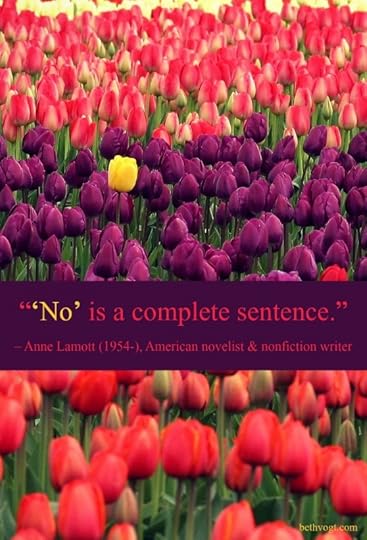
“‘No’ is a complete sentence.”
I read today’s quote and thought, “Huh.”
Author Anne Lamott spoke a whole lot of truth with those five words.
We can say “no” to someone and not feel obligated to offer our reasons for declining an invitation or for stepping away from an opportunity.
We can say “no” and resist someone’s second and third attempts to persuade us to change our minds or to pray about this decision again — as if we hadn’t thought out our “no” well enough the first time. As if we hadn’t prayed over our decision sufficiently to hear God’s voice leading us to a “no,” not a “yes.”
“No” is a sufficient response. We don’t have to say, “No, and I’m so sorry I can’t (fill in the blank), but I have to (fill in the blank).” We don’t have to say, “No, I won’t be there, but (proceed to list all the reasons why you can’t make the meeting or the get-together or the church activity or the family gathering).”
Just say “no” … and know your simple “N-O” answer is enough. Other people may not like it, but that doesn’t mean you owe them anything more than a polite “no.”
In Your Words: What do you think about “no” being a complete sentence? How does that work for you?
In Others' Words: Just Say No http://bit.ly/2Jgprb4 #quotes #perspective
Click To Tweet
'No is a complete sentence.' @AnneLamottQuotes http://bit.ly/2Jgprb4 #boundaries #relationships
Click To Tweet
Published on July 11, 2018 23:01
 newest »
newest »
 newest »
newest »
 So well said, Beth. It's so easy to feel guilty over not doing something, but remembering to keep it short and simple is good advice. :)
So well said, Beth. It's so easy to feel guilty over not doing something, but remembering to keep it short and simple is good advice. :)





